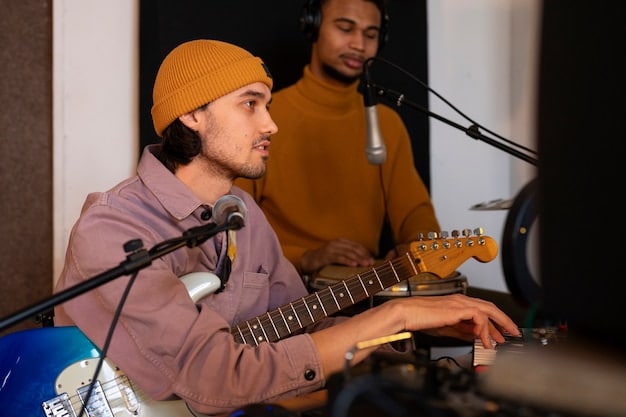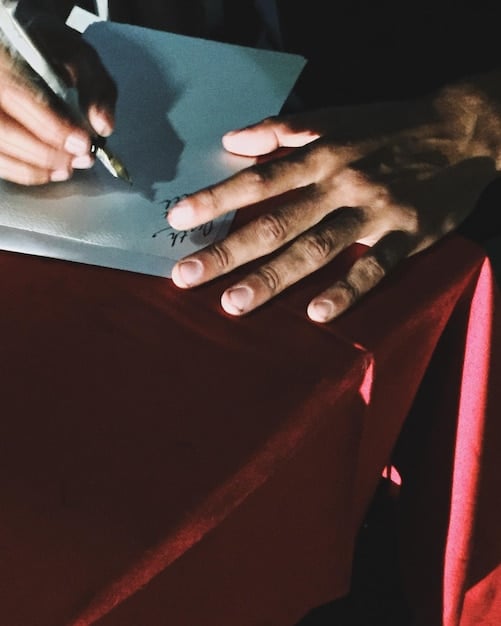Demystifying Music Publishing for Emerging US Rap Artists in 2025

Demystifying music publishing for emerging US rap artists in 2025 involves understanding copyright law, establishing publishing entities, registering songs, negotiating deals, collecting royalties, and strategically networking within the music industry.
Navigating the music industry can be daunting, especially when it comes to understanding music publishing. This guide aims to demystify the process for emerging US rap artists: demystifying music publishing – a step-by-step guide for 2025, providing the knowledge and tools needed to succeed.
Understanding the Basics of Music Publishing
Music publishing is a critical component of the music industry, often misunderstood by emerging artists. It’s essential to grasp the fundamentals to protect your work and maximize your revenue streams. Let’s dive into what music publishing entails.
At its core, music publishing is about the ownership and administration of musical compositions. This includes the lyrics and melodies, separate from the sound recording. Understanding these rights is the first step towards navigating the publishing landscape.
What Does a Music Publisher Do?
A music publisher essentially acts as a caretaker and promoter of your songs. They manage copyrights, collect royalties, and seek opportunities for your music to be used in various media.
Their responsibilities extend to:
- Copyrighting your songs.
- Licensing your music for films, TV shows, commercials, and other media.
- Collecting royalties from various sources, including performance, mechanical, and synchronization.
- Promoting your songs to artists, labels, and industry professionals.
Ultimately, a publisher’s goal is to ensure your music is heard and that you are compensated fairly for its use.
In conclusion, understanding the role of a music publisher and the basics of music publishing is essential for emerging rap artists. It allows you to take control of your creative work and ensure you are duly compensated for it.
Copyright Law and Your Music
Copyright law is the bedrock of music publishing. It grants creators exclusive rights to their original works, including musical compositions. To effectively manage your music, you must understand the basics of copyright.
Registering your songs with the U.S. Copyright Office provides legal protection and allows you to pursue legal action against infringers. It’s a crucial step in safeguarding your creative assets.
Copyright Protection Explained
Copyright protects your musical compositions from unauthorized use, reproduction, distribution, and adaptation. This protection extends to both the melody and the lyrics of your songs.
Key aspects of copyright protection include:
- Originality: Your work must be original and not copied from another source.
- Tangible Form: Your work must be fixed in a tangible medium, such as a recording or written notation.
- Duration: Copyright protection generally lasts for the life of the author plus 70 years.
Understanding these elements ensures you can leverage copyright to protect your music and career.
In summary, copyright law is a vital tool for emerging rap artists. Properly registering and understanding your rights ensures your creative work is protected and that you can benefit from it.

Setting Up Your Music Publishing Entity
For emerging rap artists aiming to professionalize their music careers, establishing a music publishing entity is a strategic move. This entity becomes the vehicle through which you manage and control your publishing rights. Let’s explore how to set one up.
Creating a publishing entity allows you to retain control over your copyrights and collect publishing royalties directly. It provides a formal structure that can enhance your credibility within the industry.
Choosing the Right Business Structure
Selecting the appropriate business structure is essential for your publishing entity. Common options include:
- Sole Proprietorship: Simple and easy to set up, but offers no personal liability protection.
- Limited Liability Company (LLC): Provides liability protection and is relatively straightforward to establish.
- Corporation: More complex but may offer tax advantages and greater credibility.
Each structure has its own legal and financial implications, so consult a legal professional to determine the best fit for your specific circumstances.
In conclusion, setting up a music publishing entity is a fundamental step for emerging rap artists. By choosing the right business structure and completing the necessary registrations, you can take greater control over your music career.
Registering Your Songs with PROs
Performance Rights Organizations (PROs) such as ASCAP, BMI, and SESAC play a crucial role in collecting performance royalties for songwriters and publishers. Registering your songs with these organizations is a must.
PROs monitor the public performance of your music, whether it’s on the radio, in a live venue, or streamed online. By registering, you ensure that you receive royalties whenever your songs are played publicly.
Key PROs and Their Benefits
Each PRO has its own membership requirements, fee structures, and royalty distribution methods. Understanding these differences helps you select which PRO (or PROs) aligns best with your music career.
- ASCAP (American Society of Composers, Authors and Publishers): Offers various educational resources and performance monitoring tools.
- BMI (Broadcast Music, Inc.): Known for its open membership policy and extensive performance tracking.
- SESAC (Society of European Stage Authors and Composers): An invitation-only PRO that offers premium services and competitive royalty rates.
Becoming affiliated with the right PRO is key to getting appropriate royalties for your hits.
In summary, registering your songs with PROs is a critical step for emerging rap artists. It enables you to tap into performance royalties and ensures you’re compensated when your music is performed publicly. Consider all options and select the PRO or PROs that best support your publishing needs.
Negotiating Music Publishing Deals
Entering into music publishing deals can be a significant milestone for emerging rap artists. These agreements define the terms under which a publisher will administer your songs, collect royalties, and promote your music. Sound complicated? Read on.
Understanding the different types of publishing deals and what each entails is key to making informed decisions about your career. Being prepared will ensure you protect your work.
Types of Music Publishing Deals
There are several types of music publishing deals, each with its own terms and implications:
- Full Publishing Deal: The publisher owns the copyright to your songs and controls all publishing rights.
- Co-Publishing Deal: You retain a percentage of the publishing rights (typically 50%), while the publisher owns the remaining share.
- Administration Deal: The publisher administers your songs and collects royalties on your behalf, but you retain ownership of the copyright.
These deals are not written in stone. Depending on your negotiation skills, you may be able to push for more. Consult with a lawyer to ensure your rights are protected.
In conclusion, negotiating music publishing deals is a critical skill for emerging rap artists. By understanding the different types of deals and negotiating favorable terms, you can secure your creative control and financial gains.

Collecting Your Royalties
Collecting royalties is the ultimate goal of music publishing. Royalties are the payments you receive for the use of your copyrighted songs. Understanding the different types of royalties and how they are collected is essential for maximizing your income from music.
Proper management of your royalties ensures a predictable income stream and helps sustain your career as a songwriter and artist. Knowledge is power.
Types of Music Royalties
Various types of royalties can be derived from music publishing, including:
- Performance Royalties: Collected by PROs when your songs are performed publicly.
- Mechanical Royalties: Generated from the reproduction and distribution of your songs (e.g., physical copies, downloads, and streaming).
- Synchronization Royalties: Earned when your songs are used in films, TV shows, commercials, and video games.
By understanding these diverse forms of royalties, you can navigate the music industry more effectively, ensuring you are paid fairly for your compositions.
In summary, collecting your royalties is a vital process for emerging rap artists. By understanding the various types of royalties and utilizing available tools, you can ensure that you receive all the income you’re entitled to.
Networking and Building Relationships
In the music industry, building relationships is as crucial as creating great music. Networking can open doors to opportunities, collaborations, and ultimately, success. If people don’t know you, they won’t play your music.
Establishing connections with industry professionals, fellow artists, and potential collaborators expands your reach and influence. Networking, however, is not something that happens overnight.
Strategies for Effective Networking
Here are some effective strategies for networking within the music industry:
- Attend industry events, conferences, and showcases: These events provide opportunities to meet and interact with industry professionals.
- Use social media strategically: Engage with other musicians, producers, and publishers on platforms like Instagram, Twitter, and LinkedIn.
- Collaborate with other artists: Working with other musicians can expand your audience and introduce you to new fans and industry contacts.
Building strong and genuine relationships can create a supportive environment and lead to valuable opportunities.
In conclusion, networking and cultivating strong relationships are essential for emerging rap artists. By actively engaging with the industry and building connections, you can exponentially increase your chances of success.
| Key Point | Brief Description |
|---|---|
| 🎵 Copyright Law | Protects your original musical works from unauthorized use. |
| 🏢 Publishing Entity | Establishes a formal structure for managing your publishing rights. |
| 🎤 PRO Registration | Ensures you collect performance royalties when your songs are played publicly. |
| 🤝 Networking | Opens doors to opportunities and collaborations in the music industry. |
[Frequently Asked Questions]
▼
Music publishing involves managing and protecting songwriting copyrights. It ensures artists get paid for the use of their music and licenses their work for broader opportunities.
▼
ASCAP and BMI are open to all, while SESAC is invitation-only. They all collect performance royalties, but differ in their member benefits and pay structures.
▼
In a co-publishing deal, the songwriter shares the publishing rights with a publisher, typically retaining a 50% ownership stake.
▼
Mechanical royalties are earned when a song is reproduced, such as through physical copies, downloads, or streaming platforms. It compensates copyright owners for each reproduction.
▼
Networking opens doors to collaborations, industry connections, and new opportunities. Building relationships is crucial for career growth in the competitive music industry.
Conclusion
Understanding music publishing is indispensable for emerging US rap artists who aspire to elevate their careers. By grasping copyright laws, PROs, and networking opportunities, you can safeguard your royalties and expand future horizons.





